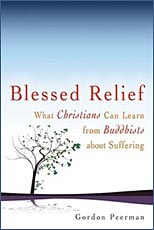Gordon Peerman is an Episcopal priest and psychotherapist in private practice and an adjunct faculty member at Vanderbilt Divinity School, where he teaches seminars in Buddhist-Christian dialogue. He also teaches Mindfulness-Based Stress Reduction at the Vanderbilt Center for Integrative Health.
For over 2,000 years, Buddhists have studied and dealt with the challenges and benefits of human suffering. In the process, they have also explored happiness, generosity, kindness, equanimity, and compassion. Peerman has spent 25 years in what he calls a "dual citizenship" in Christianity and Buddhism. In this enlightening book, he opens the door of freedom for us so we can leave fear and all its companion stories behind. Peerman shares many of his retreat experiences and presents nine practices that address the problem of human suffering:
• The Three-Minute Breathing Space
• The Work
• The Practice of Inquiry
• The Sacred Breath
• Working with RAIN
• Nonviolent Communication (NVC)
• The Practice of Beginning Anew
• The Five Remembrances
• Compassion Practice
On a contemplative kayaking retreat in the wilderness of southern Alaska, Peerman confronts the grasping of his small mind, organized around "me and mine," and revels in the openness of the big mind which knows the truth of impermanence. In his probes on suffering, he comes to see that it is a waste of time to try to find out the cause of suffering — better to focus on a way to follow when suffering comes.
The Buddhist wisdom teachers proclaim that it is our resistance to what is that is the source of all our problems. Peerman does a fine job of explaining how the Work of Byron Katie is helpful in questioning our thoughts and stories about reality. Further explication comes with his comments on the ten believed thoughts that lead to suffering identified by Tara Bennett-Goleman.
In an interesting chapter on "Quiet Ambition," the author examines his external need to be seen and recognized as special, one who is immensely accomplished, along with his internal fears of not being good enough. Peerman holds this tension in his awareness and comes to a deeper realization of his reactivity. He brings the same mindfulness to anger and the option of transforming it into compassion and peace.
On another retreat, Peerman deals with his own spiritual edge through the process of Nonviolent Communication espoused by Marshall Rosenberg. He uses the Beginning Anew ceremony developed by Thich Nhat Hanh with his wife and deals with his grief over the death of his father by bowing to the moment. Peerman closes with his involvement in a Mobile Loaves and Fishes project which enables him to practice compassion. He calls it a softening of the heart: "Our work, our inner work, is to transform anger into justice, hurt into compassion, suffering into wisdom."
